Do Canadians Need a Visa for Japan? No, Canadian citizens do not need a visa to visit Japan for short-term stays.
Thanks to the visa exemption agreement between Canada and Japan, Canadians can enjoy visa-free travel to Japan for up to 90 days when visiting for tourism, business meetings, or family visits.
This bilateral agreement reflects the strong diplomatic relations between the two countries and makes Japan an accessible destination for Canadian passport holders. The visa exemption has been in place for many years, simplifying travel between these nations.
Who Qualifies for Visa-Free Entry?

To qualify for visa-free entry to Japan, you must:
- Be a Canadian citizen with a valid Canadian passport
- Plan to stay for 90 days or less
- Visit for purposes of tourism, business meetings, visiting friends/family
- Have a confirmed return ticket or proof of onward travel
- Possess sufficient funds to support yourself during your stay
This visa exemption applies specifically to Canadian citizens. It’s important to note that Canadian permanent residents who are not Canadian citizens must follow the visa requirements based on their nationality.
While most Canadian travelers to Japan fall under this visa-free arrangement, there are exceptions for those planning to work, study, or stay longer than 90 days. In these cases, appropriate visas must be obtained before departure.
The 90-day period begins from your date of entry into Japan, and immigration officers have the final authority to determine your eligibility for entry at the border.
Also Read: How To Get Working Visa In Japan? & Japan Vs Canada: What Is More Safe
Requirements for Visa-Free Entry to Japan

Canadian citizens enjoy the privilege of visa-free entry to Japan, but there are several key requirements that must be met to ensure a smooth arrival experience. Understanding these requirements before your trip can help you avoid complications at Japanese immigration.
Valid Passport Requirements
Your Canadian passport must be valid for the entire duration of your stay in Japan. While Japan doesn’t specifically require additional validity beyond your planned departure date, many airlines follow the standard practice of requiring at least 6 months of validity remaining on your passport from your planned departure date from Japan.
Additionally, your passport should:
- Be in good condition without significant damage
- Have at least two blank visa pages for entry/exit stamps
- Be machine-readable (all modern Canadian passports meet this requirement)
Airline-Specific Rules
Airlines may enforce their own requirements beyond what Japanese immigration mandates. These typically include:
- Passport validity: Many airlines require 6 months validity beyond your return date
- Return ticket verification: Proof of onward travel is often checked at boarding
- Travel documentation: Some airlines may request to see hotel reservations or travel itineraries
It’s advisable to check with your specific airline before departure to ensure you meet all their requirements for boarding your flight to Japan.
Allowed Activities Under Visa-Free Status
The 90-day visa exemption for Canadians permits a range of activities, including:
✅ Tourism and sightseeing
✅ Visiting friends and family
✅ Attending business meetings and conferences
✅ Short-term cultural exchanges
✅ Participating in unpaid volunteer work
❌ Activities that are not permitted under visa-free entry include:
- Engaging in paid work
- Starting a business
- Enrolling in educational programs
- Participating in paid performances
Proof of Onward Travel
Japanese immigration authorities may request evidence that you plan to leave Japan within the 90-day period. Acceptable proof includes:
- Return or onward airline tickets
- Train or ferry tickets to another country
- Confirmed tour itineraries showing departure dates
While not always checked, having this documentation readily available is recommended.
Financial Means Requirements
Visitors must demonstrate sufficient funds to support themselves during their stay in Japan. While there’s no specific amount officially stated, it’s recommended to have:
- Access to approximately 30,000 yen (roughly CAD $270) per day of your stay
- Credit cards, bank statements, or cash as proof of financial means
Immigration officers have discretion to verify your financial capacity, particularly for longer stays.
Immigration Procedures Upon Arrival
When arriving in Japan, Canadian travelers must complete:
- A disembarkation card (typically distributed on the plane)
- A customs declaration form
- Biometric processing (fingerprints and photograph)
- A brief interview with an immigration officer
| Required Documents | Purpose |
|---|---|
| Valid Canadian passport | Proof of citizenship and identity |
| Completed disembarkation card | Registration of your visit |
| Return/onward ticket | Proof of intent to leave within 90 days |
| Hotel reservations/address in Japan | Verification of accommodation |
| Customs declaration form | Declaration of items being brought into Japan |
Upon approval, you’ll receive a temporary visitor stamp in your passport indicating your permitted length of stay (typically the full 90 days for Canadians).
Remember that immigration officers have the final authority to grant or deny entry, even if you meet all the stated requirements.
Being polite, providing clear answers about your travel plans, and having all your documentation organized will help ensure a smooth entry process.
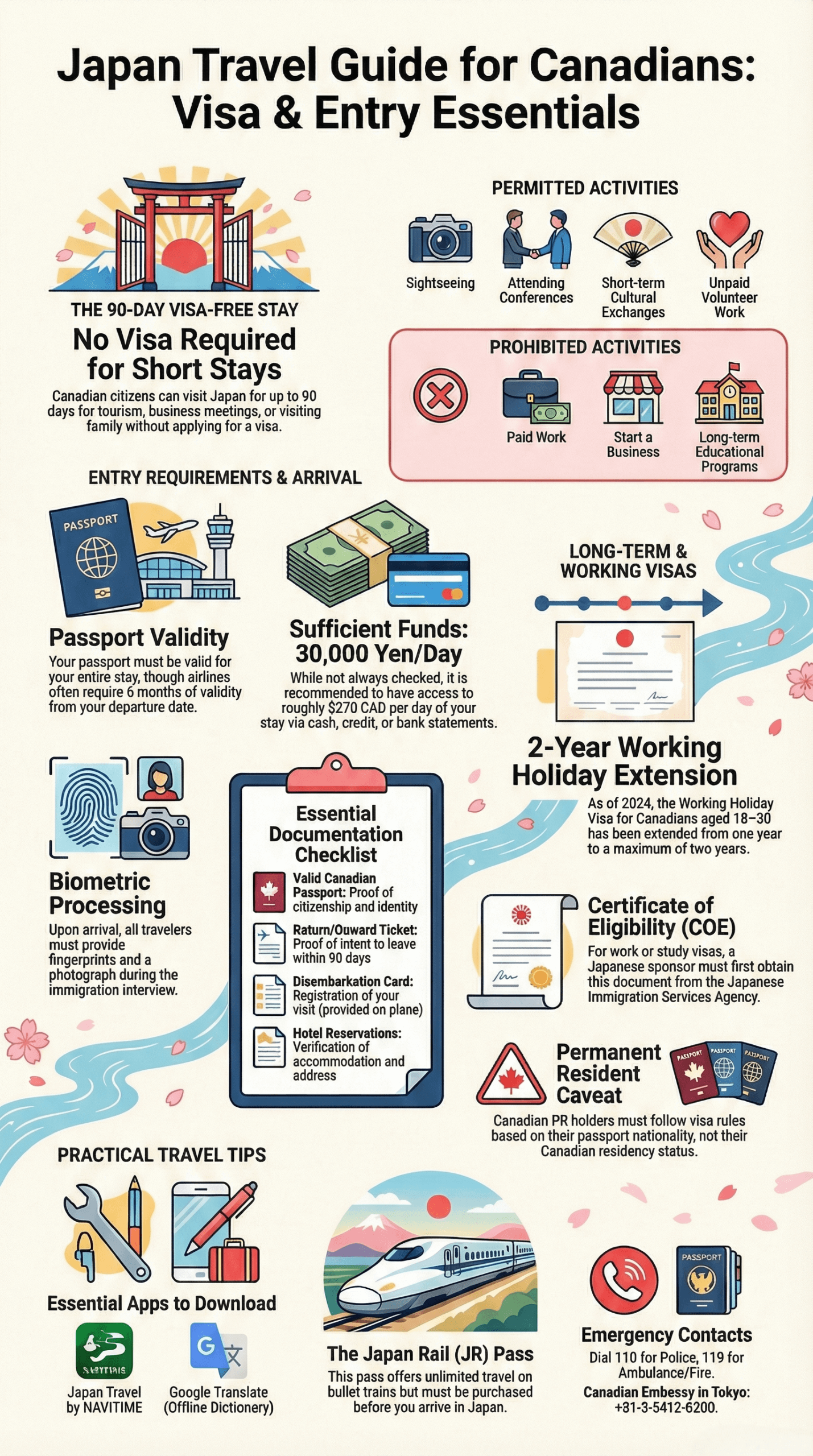
Also Read: Can You Apply Japan Visa Online? & How Long Can You Stay In Japan Without Visa?
When Do Canadians Need a Visa for Japan?
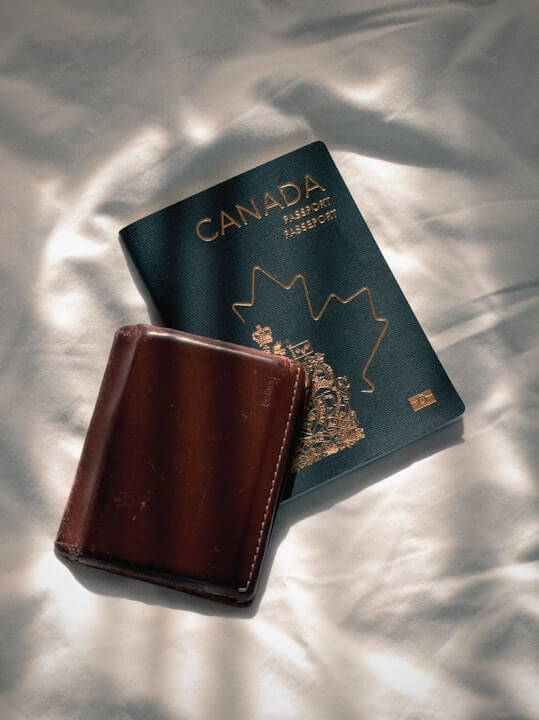
While the visa exemption makes short visits convenient, there are several situations where Canadian citizens must obtain a proper visa before traveling to Japan.
Stays Exceeding 90 Days
The visa-free entry privilege is strictly limited to 90 consecutive days. If you’re planning to:
- Study at a Japanese institution for a full semester or year
- Work for a Japanese company
- Join family members for an extended period
- Conduct research or participate in cultural exchange programs
You’ll need to apply for the appropriate visa that matches your intended activities and duration of stay.
Employment and Professional Activities
Any form of paid work or professional engagement requires a proper work visa. This includes:
- Full-time employment
- Freelance work for Japanese clients
- Teaching positions (including English teaching)
- Professional performances or athletic competitions
- Technical or specialized work assignments
The Japanese immigration system offers various work visa categories based on your qualifications and the nature of your employment.
Study and Research Activities
Canadian students planning to study at Japanese educational institutions need to obtain a student visa if their program exceeds 90 days. This applies to:
- University degree programs
- Language schools (when the course exceeds 90 days)
- Research positions at academic institutions
- Cultural apprenticeships (traditional arts, crafts)
Types of Visas Available to Canadians
Japan offers numerous visa categories tailored to specific purposes:
| Visa Type | Purpose | Typical Duration |
|---|---|---|
| Student | Academic study at recognized institutions | 6 months to 4+ years |
| Work | Employment with Japanese companies | 1-5 years |
| Dependent | Accompanying family members of visa holders | Matches primary visa holder |
| Specified Skilled Worker | Technical fields with labor shortages | 1-5 years |
| Highly Skilled Professional | Specialized knowledge workers | 5 years with path to permanent residency |
| Cultural Activities | Non-profit cultural pursuits | 3 months to 3 years |
| Medical Stay | Receiving medical treatment | Up to 1 year |
Certificate of Eligibility Requirement
For most visa types, you’ll first need a Certificate of Eligibility (COE) before applying for the actual visa. This document:
- Is applied for by your Japanese sponsor (employer, school, or family member)
- Verifies you meet the requirements for your intended visa category
- Significantly increases the likelihood of visa approval
- Streamlines the application process
The COE application is submitted to the Immigration Services Agency of Japan by your sponsor. Once issued, the original certificate must be sent to you in Canada.
Visa Application Process
The general process for obtaining a Japanese visa involves:
- Securing a sponsor in Japan (employer, educational institution, or family member)
- Obtaining a Certificate of Eligibility through your sponsor
- Gathering required documentation:
- Valid Canadian passport
- Visa application form
- Recent passport-sized photographs
- Original Certificate of Eligibility
- Supporting documents specific to your visa category
- Submitting your application to the Embassy or Consulate of Japan in Canada
- Paying the visa fee (varies by visa type and duration)
- Collecting your visa once approved (typically takes 5-7 business days)
Important: Visa requirements and procedures may change, so always check the most current information through official Japanese diplomatic missions in Canada before beginning your application process.
Also Read: Where To Buy SIM Card In Japan? & Where Can You Use Suica Card In Japan?
Working Holiday Visa for Canadian Citizens

The Working Holiday Visa represents an exceptional opportunity for young Canadians looking to experience Japanese culture beyond the typical tourist experience.
This special visa arrangement between Canada and Japan allows eligible Canadians to live, work, and travel in Japan for an extended period.
Overview of Canada-Japan Working Holiday Program
The Canada-Japan Working Holiday Program was established to strengthen cultural ties between the two nations by allowing young citizens to gain a deeper understanding of each other’s culture, society, and way of life.
Unlike the standard 90-day visa-free entry, this program enables participants to legally work to supplement their travel funds while experiencing life in Japan.
The program operates on a reciprocal basis, with both countries offering similar opportunities to each other’s citizens.
For Canadians, this represents a unique pathway to immerse themselves in Japanese society with fewer restrictions than traditional visa categories.
Eligibility Requirements
To qualify for the Japan Working Holiday Visa, Canadian applicants must meet the following criteria:
- Hold a valid Canadian passport
- Be between 18 and 30 years of age at the time of application
- Not be accompanied by dependents or children
- Possess sufficient funds to support themselves during the initial period of stay (generally around 200,000-250,000 yen)
- Have a return ticket or sufficient funds to purchase one
- Intend to leave Japan at the end of their stay
- Be in good health and have no criminal record
- Not have previously participated in the Working Holiday Program in Japan
Application Process
The application process for a Working Holiday Visa involves several steps:
- Gather required documents:
- Completed visa application form
- Valid Canadian passport
- Recent passport-sized photographs
- Detailed travel itinerary or plan
- Proof of sufficient funds (bank statements)
- Return ticket or proof of funds to purchase one
- Certificate of health
- Resume or CV
- Submit application to the nearest Japanese Embassy or Consulate in Canada
- Attend an interview if requested by the consular officer
- Receive visa approval (typically processed within 1-2 weeks)
- Enter Japan within three months of visa issuance
Note: There is no fee for the Working Holiday Visa application.
New Two-Year Extension in 2024
In a significant development for the program, starting in 2024, Japan has extended the maximum duration of the Working Holiday Visa from one year to two years.
This change offers Canadian participants twice the time to explore, work, and immerse themselves in Japanese culture.
This extension reflects the strong diplomatic relationship between Canada and Japan and recognizes the program’s success in fostering cultural exchange. The two-year duration provides several advantages:
- More time to develop Japanese language skills
- Opportunities for longer-term employment
- Deeper cultural immersion
- Greater travel opportunities throughout Japan
- Enhanced resume-building potential
Benefits and Restrictions
Benefits:
- Work authorization: Legal permission to engage in almost any type of employment
- Flexible stay: Freedom to travel throughout Japan during the visa period
- Cultural immersion: Opportunities to experience Japanese life beyond tourism
- Language acquisition: Extended time to develop Japanese language skills
- International experience: Valuable cross-cultural experience for personal and professional development
Restrictions:
| Restriction | Details |
|---|---|
| Employment limitations | Cannot work in establishments affecting public morals (bars, nightclubs, gambling venues) |
| Primary purpose | Main objective must be holiday, with work being secondary |
| Extension limitations | Cannot be extended beyond the maximum period (now two years) |
| One-time opportunity | Can only participate in the program once in a lifetime |
| No dependents | Cannot bring family members or dependents on this visa |
The Working Holiday Visa offers a balanced approach for Canadians seeking to experience Japan beyond the typical tourist experience.
With the new two-year duration, participants have even greater opportunities to develop meaningful connections with Japanese culture, society, and people while gaining valuable international experience.
Special Considerations for Canadian Permanent Residents

Canadian permanent residents face different visa requirements when traveling to Japan compared to Canadian citizens.
Unlike Canadian passport holders who enjoy visa-free entry, permanent residents must follow regulations based on their passport nationality.
Visa Requirements Based on Passport Nationality
Canadian permanent residents must check visa requirements based on the country that issued their passport, not their residency status in Canada. For example:
- If you’re a permanent resident holding a passport from the UK, Australia, or New Zealand, you’ll still qualify for visa-free entry
- If your passport is from a country not included in Japan’s visa exemption program (such as India, China, or Nigeria), you’ll need to apply for a visa regardless of your Canadian permanent residency
This distinction is crucial, as immigration officers at Japanese ports of entry will process your entry based on your passport nationality, not your Canadian permanent resident card.
Special Cases for Permanent Residents
Some special circumstances may affect visa requirements for permanent residents:
- Refugee travel documents: If you’re traveling with a refugee travel document issued by Canada, you’ll generally need to apply for a visa before traveling to Japan
- Stateless persons: Those with travel documents for stateless persons must obtain a visa prior to departure
- Permanent resident cards alone are not sufficient for entry to Japan—you must travel with a valid passport
Dual Citizenship Considerations
For travelers with dual citizenship including Canadian citizenship:
- Enter and exit Japan with the same passport: Japanese immigration recommends using the same passport for entry and exit
- Canadian-Japanese dual citizens over 22 years old should be aware of Japan’s stance on dual nationality and may need to declare their citizenship choice
- If you hold both Canadian and another country’s citizenship, consider which passport offers the most favorable entry conditions
Transit Rules for Permanent Residents
When transiting through Japan:
- Airport transit: Most Canadian permanent residents can transit through the international area of Japanese airports without a visa if they have confirmed onward tickets and don’t pass through immigration
- Transit visas: Required if you plan to leave the airport during a layover or transfer between airports (like Narita to Haneda)
- Shore passes: Cruise ship passengers who are Canadian permanent residents should check if their nationality qualifies for temporary landing permission
For permanent residents planning longer stays, employment, or specific activities in Japan, consulting with the Japanese embassy or consulate in Canada is essential to determine the appropriate visa category and application requirements.
Applying for a Japanese Visa: Step-by-Step Guide
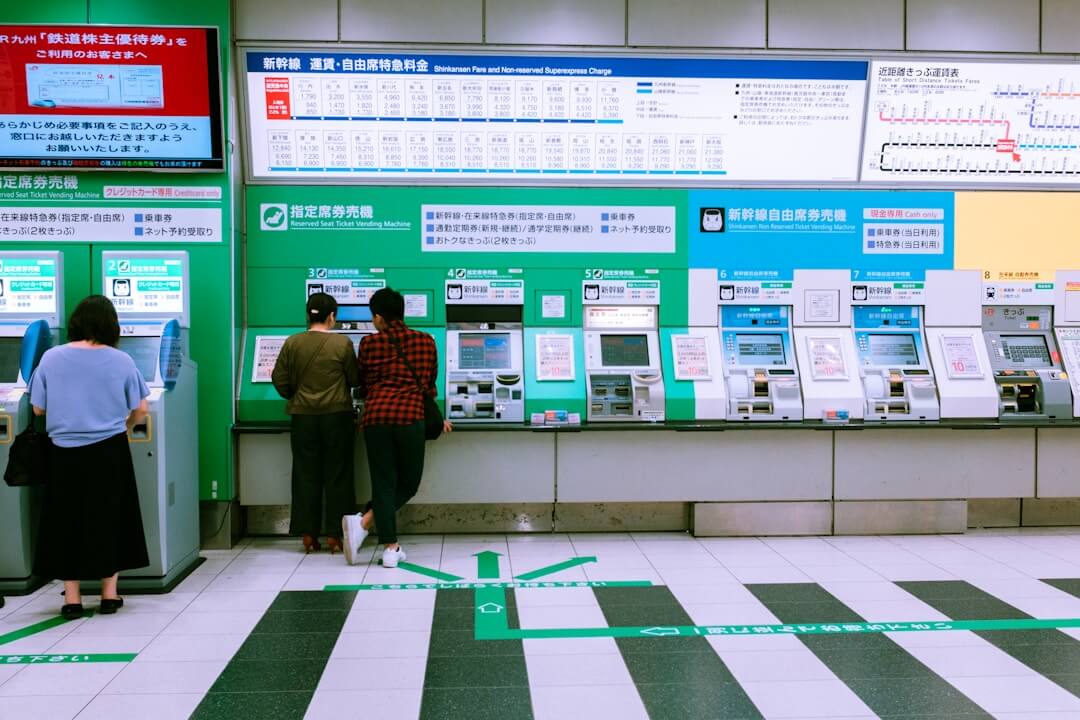
When Canadians need to apply for a visa to Japan (for stays beyond 90 days or for work purposes), the process involves several important steps and requirements. Understanding this process thoroughly can help ensure a smooth application experience.
Where to Apply
Canadian citizens must submit their visa applications to the Embassy of Japan in Canada or at one of the Japanese Consulates located in:
- Vancouver
- Calgary
- Toronto
- Montreal
Applications must be submitted in person or through an authorized representative. Unlike some countries, Japan does not offer an online application system for tourist or work visas.
Required Documents
The specific documentation required varies depending on the type of visa, but generally includes:
| Basic Documents | Additional Documents |
|---|---|
| Valid Canadian passport (with at least 6 months validity beyond intended stay) | Certificate of Eligibility (for work, student, and certain other visas) |
| Completed visa application form | Proof of financial means (bank statements) |
| Recent passport-sized photograph (4.5cm × 3.5cm with white background) | Detailed itinerary of stay in Japan |
| Proof of current status in Canada | Letter of guarantee from Japanese host/sponsor |
| Flight itinerary (not necessarily purchased tickets) | Employment documentation (for work visas) |
For work-related visas, the most crucial document is the Certificate of Eligibility (COE), which must be obtained by your Japanese employer or sponsor before you apply for the visa.
Processing Times
The visa processing timeline typically follows this schedule:
- Certificate of Eligibility: 1-3 months (processed in Japan)
- Standard visa processing: 5-7 business days after submission
- Expedited processing: 2-3 business days (if available and for genuine emergencies)
Processing times may vary based on the season, visa type, and current application volume. Applications submitted during peak travel seasons (spring cherry blossom season and summer) may take longer.
Visa Fees
As of 2023, the visa fees for Canadian applicants are:
- Single-entry visa: CAD $40
- Multiple-entry visa: CAD $80
- Transit visa: CAD $25
Payment must be made by money order or certified cheque payable to the “Embassy of Japan” or relevant consulate. Personal cheques and cash are typically not accepted.
Interview Process
Most Canadian applicants do not require an interview for standard tourist or business visas. However, for certain visa categories such as work visas, cultural activities, or long-term stays, the consular officer may request an interview to:
- Verify the purpose of your visit
- Confirm your ties to Canada
- Assess your understanding of Japanese regulations
- Clarify any questions about your application
If requested, interviews are typically brief (10-15 minutes) and focus on confirming the details provided in your application.
Tips for a Successful Application
- Submit complete documentation: Incomplete applications are the most common reason for delays or rejections.
- Apply well in advance: Begin the process at least 1-2 months before your intended travel date.
- Be consistent: Ensure all information across your documents is consistent (names, dates, purpose of visit).
- Provide clear photocopies: All supporting documents should be clearly legible.
- Follow specific instructions: Each consulate may have slightly different requirements, so check their specific website.
- Demonstrate ties to Canada: Evidence of your intention to return (property ownership, employment letter, family ties) can strengthen your application.
- Maintain passport validity: Ensure your passport remains valid for the duration of your stay plus at least 6 months.
- Be honest: Misrepresentation can result in immediate rejection and potential bans from future entry.
For specialized visas such as journalist, religious, or diplomatic visas, additional requirements apply, and applicants should contact the Japanese diplomatic mission directly for specific guidance.
Practical Travel Tips for Canadians Visiting Japan
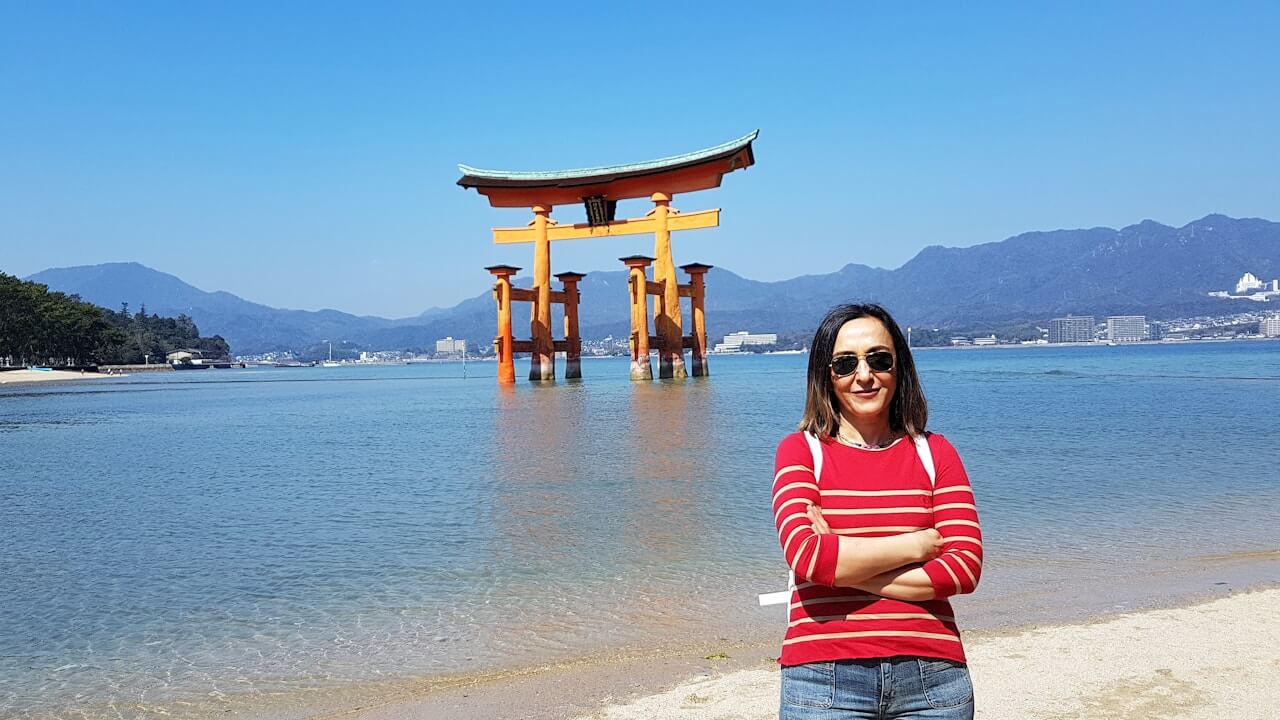
Planning your Japanese adventure goes beyond understanding visa requirements. These practical tips will help ensure a smooth and enjoyable experience in the Land of the Rising Sun.
Travel Insurance Recommendations
Travel insurance is absolutely essential when visiting Japan. While Japan offers excellent healthcare, medical costs for foreigners can be extremely high without insurance. Look for policies that include:
- Emergency medical coverage (minimum $1 million recommended)
- Trip cancellation/interruption protection
- Lost luggage compensation
- Emergency evacuation services
- Coverage for activities you plan to participate in (skiing, hiking, etc.)
Canadian insurance providers like Manulife, Blue Cross, and TD Insurance offer comprehensive travel packages specifically designed for Japan travel.
Many credit cards also provide travel insurance, but always verify the coverage limits and exclusions before relying solely on these benefits.
Useful Apps and Resources
Download these essential apps before departing:
| App Name | Purpose | Key Features |
|---|---|---|
| Japan Travel by NAVITIME | Navigation | Offline maps, train schedules, tourist information |
| Google Translate | Language | Camera translation, offline Japanese dictionary |
| LINE | Communication | Most popular messaging app in Japan |
| JR EAST Train Info | Transportation | Real-time updates on JR trains |
| 7-11 Banking | Finance | ATM locator for international card compatibility |
The Japan National Tourism Organization website and app also provide valuable information on attractions, events, and emergency services throughout the country.
JR Pass Information
The Japan Rail (JR) Pass offers unlimited travel on JR trains, including most shinkansen (bullet trains), for a fixed price. For Canadians planning to visit multiple cities, this pass often represents significant savings.
Key JR Pass details:
- Must be purchased before arriving in Japan
- Available in 7, 14, and 21-day options
- Requires exchange of voucher at JR offices upon arrival
- Not valid on Nozomi and Mizuho shinkansen (fastest trains)
- Regional passes available for specific areas of Japan
Calculate whether the pass is worthwhile by comparing the cost against individual tickets for your planned itinerary using tools like the Japan Rail Pass Calculator.
Emergency Contact Information
Keep these emergency contacts handy during your stay:
- Police: 110
- Ambulance/Fire: 119
- Japan Visitor Hotline: 050-3816-2787 (24/7 multilingual support)
- Canadian Embassy in Tokyo: +81-3-5412-6200
- Canadian Consulate in Nagoya: +81-52-972-0450
- Canadian Consulate in Osaka: +81-6-6315-5900
Register with the Registration of Canadians Abroad service before your trip so the Canadian government can contact you in case of emergency.
Cultural Considerations
Understanding Japanese etiquette will enhance your experience and show respect for local customs:
- Remove shoes when entering homes, traditional ryokans, and some restaurants
- Bow slightly when greeting people (handshakes are becoming more common but not universal)
- Avoid eating while walking in public spaces
- Be mindful of noise levels on public transportation
- Carry a small towel as many public restrooms don’t provide paper towels
- Learn basic phrases in Japanese (even simple greetings are appreciated)
- Tipping is not expected and may even cause confusion
Public transportation in Japan operates with remarkable punctuality. Plan to arrive at stations a few minutes early, as trains and buses depart precisely on schedule.
Frequently Asked Questions
Can I extend my visa-free stay in Japan beyond 90 days?
No, you cannot extend your 90-day visa-free period while in Japan. If you need to stay longer, you must exit Japan and re-enter, though immigration officers may deny re-entry if they suspect you’re attempting to circumvent visa requirements. For stays longer than 90 days, apply for the appropriate visa before your trip.
Do Canadian children need separate documentation to enter Japan?
Yes, all Canadian citizens regardless of age require their own valid passport to enter Japan. Children traveling on a parent’s passport are not permitted entry. There are no special exemptions for minors, and the same 90-day visa-free rule applies to children.
Can I attend business meetings in Japan without a visa?
Yes, Canadian citizens can participate in business meetings, conferences, and negotiations under the visa-free program, provided they are not receiving payment from a Japanese entity. Activities like market research, contract discussions, and attending trade shows are permitted, but any paid work requires a proper work visa.
What happens if I accidentally overstay my 90-day period?
Overstaying your permitted period is a serious offense in Japan. Consequences include fines, detention, deportation, and potential bans from re-entering Japan for 1-10 years depending on the duration of overstay. Always monitor your permitted stay carefully and depart before it expires.
Can I enter Japan for medical treatment without a visa?
Canadian citizens can enter Japan for short-term medical treatment under the visa-free program, provided the stay doesn’t exceed 90 days. For longer treatment periods, you should apply for a medical visa. Bring documentation from your doctor and the Japanese medical facility that will treat you.
How does the “cooling-off period” work for re-entering Japan?
While there’s no official rule specifying how long you must stay outside Japan before re-entering, immigration officers have discretion to deny entry if they suspect you’re using consecutive short visits to circumvent visa requirements. Many travelers follow an unofficial guideline of staying outside Japan for at least the same amount of time they spent in the country.
Can I transit through Japan without a visa?
Canadian citizens do not need a transit visa when passing through Japanese airports, even if changing terminals. If you plan to leave the airport during a layover, you can do so under the 90-day visa-free entry, regardless of how short your stay will be.
What if my passport expires while I’m in Japan?
If your passport expires during your stay in Japan, you should contact the Canadian embassy or consulate in Japan immediately to apply for a new passport. Once you receive your new passport, you must visit a regional immigration office to have your entry stamp transferred to the new passport.
Can I work remotely for my Canadian employer while visiting Japan?
This falls into a gray area. While technically you’re not seeking employment from a Japanese company, extended periods of remote work may be considered unauthorized employment. For short trips where you occasionally check emails or take calls, this is generally acceptable. For longer periods of remote work, consider applying for the appropriate visa.
What documentation should I carry when entering Japan?
Besides your valid Canadian passport, it’s advisable to carry proof of onward travel (return ticket), proof of accommodation arrangements, and evidence of sufficient funds to support yourself during your stay. While not always requested, having these documents ready can help ensure a smooth entry process.

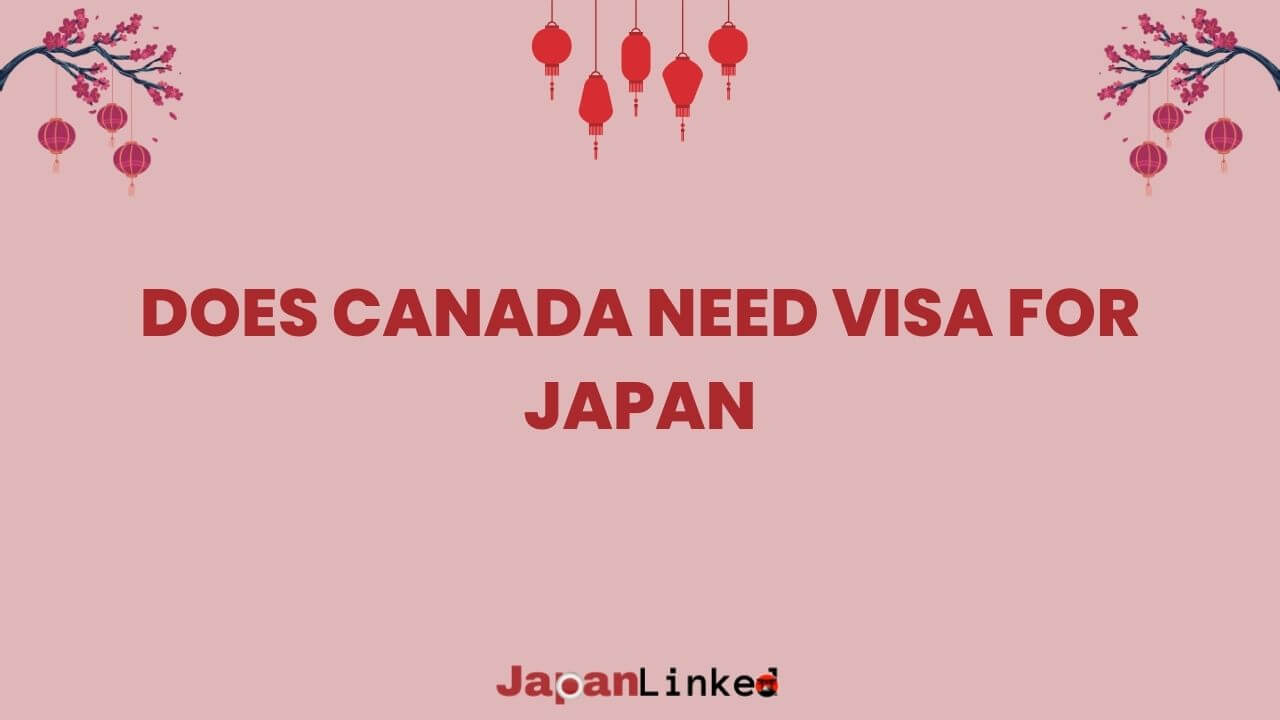
This is the best resource I’ve found for Canadian travelers to Japan! I’m planning a 6-week trip and the detail about the 90-day limit and what documents to bring was super helpful. The emergency contact info is getting saved in my phone right now. Thanks for putting this together!
Hi James! Six weeks is a great amount of time to really experience Japan. Smart move saving those emergency contacts – hopefully you won’t need them, but always good to be prepared. Thanks for reading and have an amazing adventure!
Excellent guide! I’m heading to Tokyo for a business conference next month and wasn’t sure if I needed a work visa. Your explanation about business meetings being allowed under visa-free entry cleared that up perfectly.
Thanks so much, David! That’s a very common question for business travelers. As long as you’re not receiving payment from Japanese companies, you’re all set with visa-free entry. Hope your conference goes well and you get some time to explore Tokyo!
This article is gold! I’ve been dreaming of visiting Japan for years and finally making it happen next fall. The step-by-step breakdown and all the linked resources made planning so much less intimidating. Can’t thank you enough!
Samantha, that’s so exciting that you’re finally making your Japan dream happen! Fall is an absolutely beautiful time with the autumn colors. So happy this made the planning process easier for you. Thanks for the kind words and enjoy every moment!
Thank you for such a thorough guide! The part about airline-specific rules was really important – I called my airline after reading this and confirmed they do require 6 months passport validity. You saved me from potential travel disruption!
Rachel, that’s great that you called to confirm! Airlines can have their own requirements beyond immigration rules, so it’s always smart to check. Really glad this prompted you to do that. Have a wonderful trip to Japan!
This is exactly what I was looking for! Planning my honeymoon to Japan and wanted to make sure we had everything in order. Your FAQ section answered questions I hadn’t even thought to ask yet. Bookmarked for reference!
Congratulations on your upcoming wedding, Melissa! Japan is such a romantic honeymoon destination. I’m thrilled this guide will help make your planning easier. Wishing you both a magical trip and a wonderful marriage!
Super clear and informative! I’m a permanent resident (not citizen) and the section explaining how my passport nationality matters was crucial. Would have shown up at the airport completely unprepared otherwise. Thank you!
Nicole, I’m really happy that section helped you! It’s one of the most commonly confused points for PR holders. Make sure to check your specific country’s requirements well before your trip. Safe travels and thanks for commenting!
This came up in my search and I’m so grateful! I was about to book my flight before checking visa requirements. The 90-day rule is perfect for my plans. Also didn’t know about the biometric processing – good to be prepared for that!
Hi Ashley! So glad you found this before booking – planning ahead always helps! The biometric process is quick and painless, just good to know it’s coming. Have a fantastic trip and thanks for reading!
Best Japan visa guide for Canadians, hands down! I loved the tables and organized format – made it so easy to scan and find exactly what I needed. The cultural tips at the end were a nice touch too!
Thank you so much, Megan! I tried to make it as user-friendly as possible because visa information can get overwhelming fast. Really appreciate you noticing the format. If you have any questions while planning your trip, I’m here to help!
This is incredibly helpful! My boyfriend and I are planning a 2-month trip and I was stressed about all the requirements. Your breakdown of the immigration process and what to expect at arrival put my mind at ease. Sharing this with him right now!
Katie, that’s wonderful! Two months will give you such an amazing experience. The immigration process is really straightforward once you know what to expect. Hope you both have an incredible time exploring Japan. Thanks for sharing the article!
Thank you so much for explaining the difference between tourist entry and work visas! I almost assumed I could do some freelance work while visiting. You saved me from a huge mistake that could have gotten me deported.
Michelle, I’m so glad this clarified that for you! It’s a very common misconception, and the consequences can be serious. If you ever do want to work in Japan, the Working Holiday Visa might be a great option. Thanks for taking the time to comment!
This guide is a lifesaver! I’m a teacher planning to visit Japan during summer break and was worried about visa complications. Now I know I can stay up to 90 days visa-free. The JR Pass tips are a bonus – definitely getting one now!
Hi Lauren! Perfect timing with summer break – you’ll have plenty of time to explore. The JR Pass is absolutely worth it if you’re visiting multiple cities. Feel free to reach out if you need any itinerary suggestions. Thanks for reading and enjoy your Japanese adventure!
Wow, this is the most detailed guide I’ve found! I’ve been researching for weeks and this answered questions I didn’t even know I had. The part about proof of funds and return tickets was especially helpful – I wouldn’t have thought to prepare that documentation.
Thank you, Jessica! I really appreciate that feedback. You’re right – those financial and travel proof requirements often catch people off guard at immigration. Being prepared makes such a difference. Wishing you a smooth entry and wonderful trip to Japan!
Perfect timing! I’m leaving for Osaka in 3 weeks and was panicking about documentation. The checklist of what to bring and the emergency contacts section are gold. Printing this out to take with me!
Hi Rebecca! So happy this came at the right time for you. Osaka is incredible – you’re going to love it! Having everything organized definitely makes the entry process smoother. Have an amazing trip and thanks for reading!
This answered literally every question I had about traveling to Japan! The detailed requirements list and the FAQ section at the end were especially helpful. Really appreciate how thorough and easy to understand this is.
Amanda, thank you so much for the kind words! I tried to cover all the common questions travelers have because I remember how overwhelming it felt planning my first trip. Happy to help make your Japan journey easier. Enjoy your adventure!
Thank you for guiding! The section on Canadian permanent residents was particularly useful since I hold PR status but not citizenship yet. Saved me from making a mistake by assuming I could enter visa-free.
Thanks for reading, Jennifer! I’m really glad that section helped – it’s a common point of confusion. Always important to check based on your passport nationality. If you have any questions about the visa application process, don’t hesitate to ask!
I had no idea about the Working Holiday Visa extension to 2 years – that’s a game changer for me since I’m 28 and have been wanting to spend time in Japan. The step-by-step breakdown of requirements saved me so much research time.
Hi Emily! So glad this helped you discover the 2-year option – it really does open up amazing opportunities for cultural immersion. At 28, you still have time to apply! Let me know if you need any other resources for your working holiday planning. Best of luck!
This was exactly what I needed! I’m planning my first trip to Tokyo next spring and was so confused about whether I needed to apply for a visa. The way you broke down the 90-day visa-free entry and all the requirements made everything crystal clear. Bookmarking this for when I start planning the details!
Thank you so much, Sarah! I’m thrilled this helped clarify things for your Tokyo trip. Spring is an absolutely beautiful time to visit – cherry blossom season is magical! If you have any other questions as you plan your trip, feel free to reach out. Safe travels!